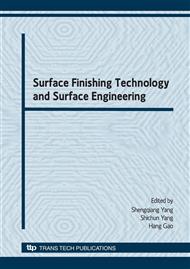p.265
p.273
p.279
p.285
p.293
p.299
p.305
p.311
p.319
The Characteristics of Surface Residual Stresses by Plane Grinding Invar and the Effects of Them on Structural Stability
Abstract:
Invar 36 alloy is widely used in manufacturing instruments because of its minimal thermal expansion coefficient. As an important material for the components of precision or super-precision instruments, the process methods for Invar and the structure stability after its machining is necessary. In this paper, the residual stresses of the Invar samples after plane grinding were measured. The experimental results indicate that clear tension stress exists in the surface of Invar alloy along the grinding direction, while, on the cross direction, the states of surface residual stresses are complicated and affected by the parameters of grinding. A typical disk model has been calculated and analyzed by Finite Element Method (FEM), and the deformation caused by surface residual stress was presented. Finally, the effect of grinding as final working procedure on the stability of Invar structure was estimated.
Info:
Periodical:
Pages:
293-298
DOI:
Citation:
Online since:
July 2008
Authors:
Keywords:
Price:
Сopyright:
© 2008 Trans Tech Publications Ltd. All Rights Reserved
Share:
Citation:


